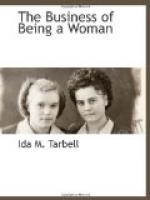To come down to the period which concerns us chiefly, that of our own Republic, it is an utter misrepresentation of the women of the Revolution to claim that they were uneducated. All things considered, they were quite as well educated as the men. The actual achievements of the eminent women produced by the system of training then in vogue is proof enough of the statement. Far and away the best letters by a woman, which have found their way into print in this country, are those of Mrs. John Adams, written late in the eighteenth century and early in the nineteenth. They deserve the permanent place in our literature which they have. But it was a period of good letter writing by women—if weak spelling and feminine spelling was, on the whole, quite as strong as masculine!
Out of that early system of education came the woman who was to write the book which did more to stir the country against slavery than all that ever had been written, Harriet Beecher Stowe. That system produced the scientist, who still represents American women in the mind of the world, Maria Mitchell, the only American woman whose name appears among the names of the world’s great scholars inscribed on the Boston Public Library. It produced Dorothea Dix, who for twenty years before the Civil War carried on perhaps the most remarkable investigation of conditions that has ever been made in this country by man or woman,—the one which required the most courage, endurance, and persistency,—her investigation of the then barbaric system for caring—or not caring—for the insane. State after state enacted new laws and instituted new methods solely on the showing of this one woman. If there were no other case to offer to the frequent cry that women have never had an influence on legislation, this would be enough. Moreover, this is but the most brilliant example of the kind of work women had been doing from the beginning of the Republic.
To my mind there is no phase of their activities which reveals better the genuineness of their training than the initiative they took in founding schools of advanced grades for girls, and in organizing primary and secondary schools on something like a national scale. Mary Lyon’s work for Mt. Holyoke College and Catherine Beecher’s for the American Woman’s Education Association are the most substantial individual achievements, though they are but types of what many women were doing and what women in general were backing up. It was work of the highest constructive type—original in its conception, full of imagination and idealism, rich in its capacity for growth—a work to fit the aspiration of its day and so full of the future!




